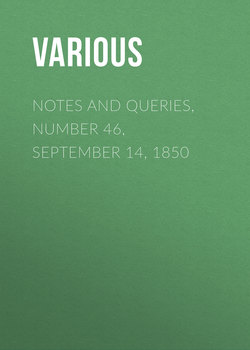Читать книгу Notes and Queries, Number 46, September 14, 1850 - Various - Страница 3
NOTES
NOTES AND QUERIES
Оглавление"There is nothing new under the sun," quoth the Preacher; and such must be said of "NOTES AND QUERIES." Your contributor M. (Vol. ii, p. 194.) has drawn attention to the Weekly Oracle, which in 1736 gave forth its responses to the inquiring public; but, as he intimates, many similar periodicals might be instanced. Thus, we have Memoirs for the Ingenious, 1693, 4to., edited by I. de la Crose; Memoirs for the Curious, 1701, 4to.; The Athenian Oracle, 1704, 8vo.; The Delphick Oracle, 1720, 8vo.; The British Apollo, 1740, 12mo.; with several others of less note. The three last quoted answer many singular questions in theology, law, medicine, physics, natural history, popular superstitions, &c., not always very satisfactorily or very intelligently, but still, often amusingly and ingeniously. The British Apollo: containing two thousand Answers to curious Questions in most Arts and Sciences, serious, comical, and humourous, the fourth edition of which I have now before me, indulges in answering such questions as these: "How old was Adam when Eve was created?—Is it lawful to eat black pudding?—Whether the moon in Ireland is like the moon in England? Where is hell situated? Do cocks lay eggs?" &c. In answer to the question, "Why is gaping catching?" the Querists of 1740 are gravely told,—
"Gaping or yawning is infectious, because the steams of the blood being ejected out of the mouth, doth infect the ambient air, which being received by the nostrils into another man's mouth, doth irritate the fibres of the hypogastric muscle to open the mouth to discharge by expiration the unfortunate gust of air infected with the steams of blood, as aforesaid."
The feminine gender, we are further told, is attributed to a ship, "because a ship carries burdens, and therefore resembles a pregnant woman."
But as the faith of 1850 in The British Apollo, with its two thousand answers, may not be equal to the faith of 1740, what dependence are we to place in the origin it attributes to two very common words, a bull, and a dun?—
"Why, when people speak improperly, is it termed a bull?—It became a proverb from the repeated blunders of one Obadiah Bull, a lawyer of London, who lived in the reign of King Henry VII."
Now for the second,—
"Pray tell me whence you can derive the original of the word dun? Some falsely think it comes from the French, where donnez signifies give me, implying a demand of something due; but the true original of this expression owes its birth to one Joe Dun, a famous bailiff of the town of Lincoln, so extremely active, and so dexterous at the management of his rough business, that it became a proverb, when a man refused to pay his debts, 'Why don't you Dun him?' that is, why don't you send Dun to arrest him? Hence it grew a custom, and is now as old as since the days of Henry VII."
Were these twin worthies, Obadiah Bull the lawyer, and Joe Dun the bailiff, men of straw for the nonce, or veritable flesh and blood? They both flourished, it appears, in the reign of Henry VII.; and to me it is doubtful whether one reign could have produced two worthies capable of cutting so deep a notch in the English tongue.
"To dine with Duke Humphrey," we are told, arose from the practice of those who had shared his dainties when alive being in the habit of perambulating St. Paul's, where he was buried, at the dining time of day; what dinner they then had, they had with Duke Humphrey the defunct.
Your contributor MR. CUNNINGHAM will be able to decide as to the value of the origin of Tyburn here given to us:
"As to the antiquity of Tyburn, it is no older than the year 1529; before that time, the place of execution was in Rotten Row in Old Street. As for the etymology of the word Tyburn, some will have it proceed from the words tye and burn, alluding to the manner of executing traitors at that place; others believe it took its name from a small river or brook once running near it, and called by the Romans Tyburnia. Whether the first or second is the truest, the querist may judge as he thinks fit."
And so say I.
A readable volume might be compiled from these "NOTES AND QUERIES," which amused our grandfathers; and the works I have indicated will afford much curious matter in etymology, folk-lore, topography, &c., to the modern antiquary.
CORKSCREW.
